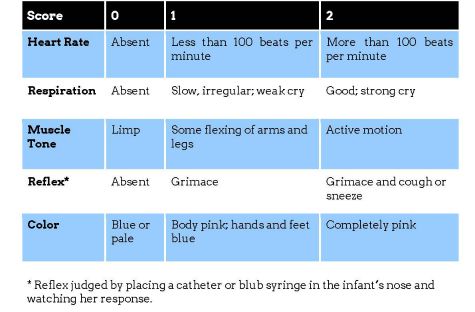As soon as your baby is
born, a delivery nurse will set one timer for one minute and another for five minutes. When each of these time periods is up, a nurse or physician will give your baby her first "tests," called
Apgars.
This scoring system
(named after its creator, Virginia Apgar) helps the physician estimate your baby's general condition at birth.
What Does the Apgar Test Measure?
The test measures your baby's:
It cannot predict how healthy she will be as she grows up or how she will develop; nor does it indicate how bright she is or what her personality is like. But it does alert the hospital staff if she is sleepier or slower to respond than normal and may need assistance as she adapts to her new world outside the womb.
How is the Apgar Test Scored?
Each characteristic is given an individual score; two points for each of the five categories if all is completely well; then all scores are totaled. For example, let's say your baby has a heart rate of more than 100,
cries lustily,
moves actively, grimaces and
coughs in response to the syringe, but is blue; her one minute Apgar score would be 8—two points off because she is blue and not pink.
Most newborn infants have Apgar scores greater than 7. Because their hands and feet remain blue until they are quite warm, few score a perfect 10.
-
If your baby's Apgar scores are between 5 and 7 at one minute, she may have experienced some problems during birth that lowered the oxygen in her blood. In this case, the hospital nursing staff probably will dry her vigorously with a towel while oxygen is held under her nose. This should start her breathing deeply and improve her oxygen supply so that her five-minute Apgar scores total between 8 and 10.
-
A small percentage of newborns have Apgar scores of less than 5. For example, babies born
prematurely or delivered by emergency
C-section are more likely to have low scores than infants with normal births. These scores may reflect difficulties the baby experienced during labor or
problems with her heart or respiratory system.
What if Your Baby Scores Low?
If your baby's Apgar scores are very low, a mask may be placed over her face to pump oxygen directly into her lungs. If she's not breathing on her own within a few minutes, a tube can be placed into her windpipe, and fluids and medications may be administered through one of the blood vessels in her
umbilical cord to strengthen her heartbeat. If her Apgar scores are still low after these treatments, she will be taken to the
special-care nursery for more intensive medical attention.
Apgar Scoring System
